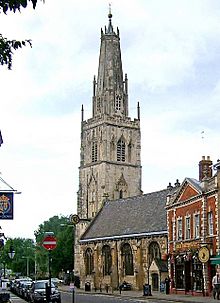St Nicholas Church, Gloucester facts for kids
Quick facts for kids St Nicholas Church, Gloucester |
|
|---|---|

St Nicholas Church from the southeast
|
|
| Lua error in Module:Location_map at line 420: attempt to index field 'wikibase' (a nil value). | |
| OS grid reference | SO 829 189 |
| Location | Westgate Street, Gloucester |
| Country | England |
| Denomination | Anglican |
| Website | St Nicholas', Gloucester [1] |
| History | |
| Dedication | Saint Nicholas |
| Architecture | |
| Functional status | Redundant |
| Heritage designation | Grade I |
| Designated | 23 January 1952 |
| Architectural type | Church |
| Style | Norman, Gothic |
| Specifications | |
| Materials | Limestone, slate roofs |
St Nicholas Church is an old and important church in Westgate Street in the city of Gloucester, England. It is looked after by The Churches Conservation Trust. This church is listed as a Grade I building, which means it's very special and protected. Its unique, shorter spire is a famous sight in the city centre.
Contents
History of St Nicholas Church
This church was first built around the year 1190. By 1203, people called it "St. Nicholas of the Bridge" in Gloucester. Most of it was rebuilt in the 1200s, but some older parts stayed. More changes were made in the 1400s, when the west tower and its tall spire were added. The spire was originally 61 metres (200 feet) high!
In the 1500s, this church's parish was the richest in Gloucester. During the Siege of Gloucester in the English Civil War in 1643, the spire was hit by a cannonball. This made it shorter, and it was capped in 1783. The church was repaired in 1865 and again after a fire in 1901.
The tower was made stronger in 1927. Between 1935 and 1938, the north aisle was rebuilt, and the church got a new roof. St Nicholas Church closed in 1967. In 1975, it was given to The Churches Conservation Trust, who have done many repairs since then.
Church Architecture
St Nicholas Church is built from limestone with slate roofs. It has a long main hall called a nave and a smaller area called a chancel. On the south side, there's a two-story entrance porch. Further along the south side is an aisle, and a small porch for the priest's door.
The Tower and Spire
At the west end of the church is a tower with a unique, shorter spire. The tower has strong corner supports called buttresses. It is divided into three sections by stone lines. Each section has windows or openings for bells. These openings have fancy stone patterns called tracery.
At the very top of the tower is a battlemented wall with decorative panels. The octagonal spire sits on top of the tower. It has small windows on each side. The top part of the spire was removed, and it now has a crown-like decoration. A lead cap with a ball shape sits at the very top. A clock is on the south side of the tower.
Church Entrances and Windows
The south porch has an arched entrance with iron gates. Inside, there's a 12th-century arched doorway. Above this doorway, a carved stone panel shows a lamb, which is a symbol of Jesus. The sides of the church have windows with three sections. At the east end of the church, there's a large window with five sections and detailed stone tracery.
Inside the Church
The tower has a special arched ceiling. The main hall (nave) has an open wooden roof. The columns and arches that separate the nave from the aisles are a mix of Norman (older) and Gothic (newer) styles.
In the chancel, there are small openings called squints that let people see the altar. There's also a piscina (a basin for washing sacred vessels) and a credence table (a small table for sacred objects). The floor of the chancel is covered with decorative tiles.
Over the south doorway, you can see the Royal arms of King Charles II. Most of the other church fittings are from the 1800s. There's a special tomb with colorful statues of Alderman John Walton, who died in 1636, and his wife.
The church once had a large organ, but it was moved to another church in 1972. St Nicholas Church has a set of six bells. The two oldest bells were made around 1499. The other bells were made in 1608, 1636 (two bells), and 1725.
 | Jackie Robinson |
 | Jack Johnson |
 | Althea Gibson |
 | Arthur Ashe |
 | Muhammad Ali |

